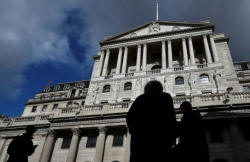|
Bank of England cuts
rates, ready for 'whatever action necessary' after
Brexit vote
 Send a link to a friend
Send a link to a friend
 [August 04, 2016]
By David Milliken and Ana Nicolaci da Costa [August 04, 2016]
By David Milliken and Ana Nicolaci da Costa
LONDON (Reuters) - The Bank of England
cut interest rates for the first time since 2009 on Thursday and
said it would buy 60 billion pounds of government debt to ease the
blow from Britain's June 23 vote to leave the European Union.
The central bank said it expected the economy to stagnate for the
rest of 2016 and suffer weak growth throughout next year. It cut its
main lending rate to a record low 0.25 percent from 0.5 percent, in
line with market expectations.
But it also launched two new schemes, one to buy 10 billion pounds
of high-grade corporate bonds and another - potentially worth up to
100 billion pounds - to ensure banks keep lending even after the cut
in interest rates.
Sterling fell 1 percent against the dollar following the
announcement, while British government bond yields hit record lows
and the main share index rose by 1 percent.
Most Monetary Policy Committee members also expected to cut Bank
Rate again this year to a rate "close to, but a little above zero",
if the economy performed as poorly as forecast.
"Following the United Kingdom's vote to leave the European Union,
the exchange rate has fallen and the outlook for growth in the short
to medium term has weakened markedly," the central bank said in its
quarterly Inflation Report.

Finance Minister Philip Hammond welcomed the rate cut and said he
and Bank of England Governor Mark Carney had "the tools we need to
support the economy as we begin this new chapter and address the
challenges ahead".
Policymakers were not completely united on how to respond to the
fallout from Brexit. The cut in Bank Rate and the measure intended
to ensure banks passed it on to consumers - known as the Term
Funding Scheme (TFS) - gained unanimous support.
But three policymakers - Kristin Forbes, Ian McCafferty and Martin
Weale - opposed raising the target for quantitative easing
government bond purchases to 435 billion pounds from the 375 billion
total reached in late 2012.
Forbes also opposed the purchases of corporate debt - something the
BoE did briefly after the financial crisis, but more to aid market
functioning than to boost growth.
Many economists had expected Forbes to oppose a rate cut after she
said last month that the central bank should not panic and instead
wait for more data on the scale of Britain's economic slowdown.
Daniel Mahoney of the Centre for Policy Studies pointed to the
inflationary effect of Thursday's package of easing measures.
"The Bank's further loosening of monetary policy could prove
problematic for the UK economy. The falling pound means that
inflationary pressures are already building up, and today’s decision
will exacerbate them," he said.
SLOWDOWN AHEAD
While many business surveys show Britain's economy has slowed
sharply and may even be entering recession, it is too soon for
official data on how the EU vote is affecting output.
[to top of second column] |

City workers walk past the Bank of England in the City of London,
Britain, March 29, 2016. REUTERS/Toby Melville

The BoE left its forecast for growth this year steady at 2.0 percent, as the
economy expanded faster in the first half of 2016 than it had expected in May.
But 2017 brings a sharp downgrade to growth of just 0.8 percent from a previous
estimate of 2.3 percent - the biggest downgrade in growth from one Inflation
Report to the next, exceeding what was seen in the financial crisis. The growth
outlook for 2018 was cut to 1.8 percent.
The BoE also revised up its inflation forecasts sharply, due to the big fall in
sterling since the financial crisis, predicting it will hit 2.4 percent in 2018
and 2019. The MPC said the costs of trying to bring it back to its 2 percent
target in the immediate future would exceed the benefit.
The MPC launched the Term Funding Scheme to make sure that the lower levels of
interest rates now set by the Bank of England are reflected in the costs
commercial banks charge households and companies to borrow funds.
The Bank said it does not expect the scheme to lead to significantly faster
aggregate loan growth, but to offset any hit to lending from a cut in official
interest rates closer to zero.
Eligible institutions will be able to borrow four-year central bank reserves for
an initial period of 18 months at rates close to the Bank Rate.
The lowest cost of funding, the 0.25 percent Bank Rate, will be for banks that
maintain or expand net lending to the economy and the BoE will charge a penalty
rate if banks reduce net lending.
The MPC said it could adjust the terms and length of the scheme, which is funded
by central bank reserves and that the value of lending will be determined by
usage of the scheme and could reach around 100 billion pounds.
Hammond, who replaced George Osborne last month, authorized the bond purchases
and the TFS.

"Alongside the actions the Bank is taking, I am prepared to take any necessary
steps to support the economy and promote confidence," Hammond said in a letter
to the central bank.
"The government will set out its fiscal plans at the Autumn Statement in the
normal way."
(Editing by Giles Elgood and Hugh Lawson)
[© 2016 Thomson Reuters. All rights
reserved.] Copyright 2016 Reuters. All rights reserved. This material may not be published,
broadcast, rewritten or redistributed. |